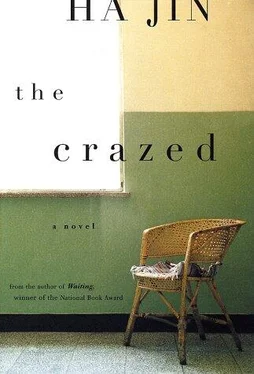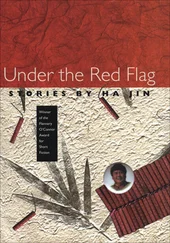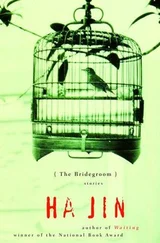“Truth be told, I do like women, a lot.”
“All right, but you shouldn’t worry too much about Meimei. Remember what Frosted Flute said about love?”
“What did he say?” Frosted Flute was a well-known local poet, though he hadn’t published his first book yet.
“He said: I won’t pick lilies and keep them, because along my way flowers will bloom one after another. I can’t recall the lines word for word. Anyway he said something like that.”
I wanted to laugh, because the quotation was altogether out of context. In his poem Frosted Flute didn’t talk about love but about the gains and losses in one’s life. Besides, women are not flowers that you can dump without qualms when you no longer need them. I said to him, “The fact is I don’t see any meaning in becoming an official either.”
“Jian, you’ve read too much and your brain has ossified. Why should we hold a powerful official position? My answer is, pure and simple, the pursuit of happiness. Once you have power, you’ll have more comfort and pleasure. We must suck all the juice out of this life!” He said the last sentence almost ferociously.
I was amazed by the earnest look on his face, which was still weather-beaten and bronze-colored. We seemed to be talking at cross-purposes. He couldn’t see that what I sought was not material gain but something significant to my being, something that could make me feel my life was properly used and fulfilled. He couldn’t understand our teacher’s cry—“I must save my soul!” He was only concerned with the flesh.
The door opened. In came the rear of a brand-new Flying Pigeon bicycle, gingerly pushed backward by Anling, her right hand holding the leather seat and her left the handlebar. She stood the bicycle alongside the wall. “Welcome. What wind brought you here?” she said to me pleasantly. She had on a pink dress with a cloth waistband fastened by a gray plastic buckle. The fashionable dress didn’t become her and made her appear rather countrified. She looked tired despite her apparently high spirits.
“I just dropped by to see how you’re doing,” I said to her.
“Any news from Meimei?”
“Yes, she’s well.”
“Good. You and Banping go on chatting. Don’t stop because of me.” She went over to the washstand behind the door and began washing her face with the water her husband had prepared for her in a basin.
Banping and I talked for a few more minutes about Mr. Yang’s condition and some undergraduates’ planning to go to Beijing. When Anling had laid on the table the stewed eggplant, corn porridge, and some steamed flower buns, I took my leave in spite of their urging me to stay for dinner. I was a bit disappointed, as I realized I shouldn’t have come to seek Banping’s advice. Granted that he treated me as a friend, speaking with complete candor, he and I by nature were different kinds of people: I was too sensitive, too introverted, and maybe too idealistic, whereas he was a paragon of peasant cunning and pragmatism. However filthy and ugly this world is, a man like him can always manage to be at home in it. People of his type have few nerves, are full of vitality, and are more likely to endure, survive, and prevail.
Unable to decide what to do, I wrote to Meimei that evening to sound her out.
May 10, 1989
Dear Meimei,
Your father is recuperating, though slowly. Don’t worry about him; he is in good hands now.
Recently I have been going through a crisis. I can no longer see any point in earning a Ph.D. I love you, Meimei. Rationally, I am supposed to take the exams, so that I can join you in Beijing and we can build our nest there. Yet deep down, I cannot help but question the meaning of such an endeavor. By “meaning” I mean how this effort is significant to my existence as a human being. I know the capital can offer me better living conditions and more opportunities, but I cannot see any meaning in the material benefits. To be honest, I don’t care much about creature comforts.
At the bottom of my crisis lies this question: What is the good of becoming a scholar who serves as no more than a clerk in the workshop of the revolution? I cannot answer this question, which your father thrust on me. At times he is delirious, but at last he speaks from his heart.
For a week or so, I haven’t been able to study for the exams. Now I feel reluctant to attempt them; probably I will withdraw my application. Don’t be angry with me, Meimei. I will explain more when you are back. Please write to me, my love.
Yours always,
Jian
PS: Your father once suggested that I apply to graduate programs at American universities. This is infeasible now. Even if I passed TOEFL and got a scholarship from abroad, my school here would not allow me to leave. A faculty member in the Foreign Languages Department got a research fellowship from the University of Pennsylvania, but she could not obtain a passport, which is contingent on the official permission from our school, so she had to forfeit the fellowship. You may know her. Her name is Kailing Wang — she collaborated with your father in translating Brecht. I just heard that outraged, she has joined the student movement. In fact, I saw her demonstrating on the streets four days ago. She claims that her human rights have been violated.
In my crisis another question is also overwhelming, namely, what can I do?
When I entered the sickroom, Mr. Yang was sleeping with the quilt up to his chin. The room was brighter than the day before; a nurse’s aide had just wiped the windowpanes and mopped the floor, which was still wet, marked with shoe prints here and there. The air smelled clean despite a touch of mothball. “How is he today?” I asked Banping.
“Awful.” He shook his heavy chin, then motioned for me to go out.
In the corridor he said to me, “He’s been sleeping since eight o’clock. At the beginning I thought it would be a quiet morning, but it turned out to be awful.”
“What happened?”
“He had bad dreams, shouting at the top of his lungs and kicking his feet. He also talked about you.”
“Me? What did he say?”
“He said you were studying at Beijing University. He was proud of you and praised you to somebody.”
“Did he really mean that?”
“I think so. By the way, do you know who asked him for a recommendation besides yourself?”
“For what?”
“I’m not sure. Somebody asked him to write a recommendation for a young man, but Mr. Yang wouldn’t do it and said, ‘I know nothing about your nephew.’ He was mad at that person, and they had a row.”
I was puzzled and said, “He never quarreled with anyone except Professor Song.” Then I remembered that the other day Mr. Yang in his sleep had begged someone to leave him and his family alone and refused the offer of a large apartment and a full professorship. But that didn’t sound like a fight.
“It couldn’t be Professor Song,” said Banping. “He can write recommendations himself.”
What confused me more was Mr. Yang’s praising me in his dream. Did he really want me to become a Ph.D. candidate at Beijing University? Why this reversal of attitude? I wished he were himself so that I could ask him.
After Banping left, I began to mull over the letter of recommendation he had mentioned. Intuitively I felt it might have some bearing on Mr. Yang’s stroke. The thought came to me that probably the person asking for the letter might be the same one who had promised Mr. Yang the apartment and the full professorship. What kind of recommendation was this? Perhaps it was for college admission. But what did the person’s nephew want to study? For what kind of degree, a B.A. or an M.A.? In what field? Classical literature? And at what school?
Читать дальше

![Lao Zi - Dao De Jing [Tao Te Ching] (english)](/books/3890/lao-zi-dao-de-jing-tao-te-ching-english-thumb.webp)
![Lao Zi - Dao De Jing [Tao Te Ching] (chinese)](/books/3891/lao-zi-dao-de-jing-tao-te-ching-chinese-thumb.webp)
![Lao Zi - Dao De Jing [Tao Te Ching] (espanol)](/books/3892/lao-zi-dao-de-jing-tao-te-ching-espanol-thumb.webp)







